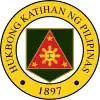| Camp Iranun | |
|---|---|
| Barira, Maguindanao del Norte in the Philippines | |
 Logo of the Philippine Army | |
.svg.png.webp) Camp Iranun Location of Camp Iranun .svg.png.webp) Camp Iranun Camp Iranun (Philippines) | |
| Coordinates | 7°13′00″N 124°15′00″E / 7.216667°N 124.25°E |
| Type | Army base |
| Area | 13,000 hectares[1] |
| Site information | |
| Owner | |
| Controlled by | |
| Site history | |
| Built | 1980s |
| Built by | Moro Islamic Liberation Front |
| In use | 1980s–2000 (by MILF) 2000–present (by Philippine Army) |
| Fate | Captured by the Philippine Army during the Battle of Camp Abubakar; renamed Camp Iranun and converted to Philippine Army use |
| Battles/wars | Battle of Camp Abubakar |
| Events | 2000 Philippine campaign against the Moro Islamic Liberation Front |
| Garrison information | |
| Garrison | 37th Infantry Battalion[1] |
Camp Iranun is a Philippine Army military base located in Barira, Maguindanao del Norte, Philippines. It is named after the Iranun people, a Moro ethnic group native to the area encompassing the boundaries of Maguindanao del Norte, Maguindanao del Sur, Lanao del Sur and North Cotabato provinces.[2]
Camp Iranun was once known as Camp Abubakar al Siddique, the largest Moro Islamic Liberation Front (MILF) camp, its largest settlement as well as the seat of its Shariah-based government.[3] It was captured by government forces during the 2000 Philippine campaign against the MILF. Camp Abubakar had been named after Abu Bakr, a Sahabi and the father-in-law of the Islamic prophet Muhammad.
As Camp Abubakar
Camp Abubakar was established in the 1980s by Salamat Hashim, after he and his comrades Murad Ebrahim and Mohagher Iqbal, broke away from the Moro National Liberation Front and Nur Misuari.[1] Camp Abubakar covered approximately forty square miles and included a mosque, a madrasah, commercial and residential areas, a weapons factory, a solar energy system, and segments of seven different villages,[4] including portions of the towns of Matanog, Barira, Buldon and Parang in Maguindanao province.[5]
Salamat Hashim, then-Chairman of the MILF, resided in a bungalow inside the camp itself, while Murad Ebrahim, then-MILF military chief had his office in the town of Matanog. Camp Abubakar was a self-sufficient entity; agricultural produce from the surrounding farms sustained the MILF fighters garrisoned in the camp. It had small businesses and public markets, and residents paid a tax to the MILF.[5]
Philippine Army garrison
The Philippine Army's 603rd Infantry Brigade garrisoned Camp Iranun after the 2000 military campaign.[3] The camp served as the brigade's headquarters until June 2015, when the unit relocated to Sultan Kudarat, Maguindanao. The Philippine Army's 37th Infantry Battalion then garrisoned Camp Iranun.[1]
During the Presidency of Benigno Aquino III, Camp Iranun was considered as a possible storage depot for decommissioned firearms surrendered by the MILF as part of a peace deal being negotiated with the government as part of the Bangsamoro peace process.[6][7]
See also
References
- 1 2 3 4 Unson, John (30 June 2015). "Army pulls out of MILF's Camp Abubakar after more than a decade". Philippine Star. Archived from the original on 24 September 2016. Retrieved 10 September 2016.
- ↑ Cabrera, Ferdinandh B. "Army builds "bridges of peace" between warring Iranun clans". Retrieved 13 September 2016.
- 1 2 Bagaoisan, Andrew Jonathan (9 July 2015). "Throwback: The fall of Camp Abubakar". ABS-CBN News. Retrieved 9 September 2016.
- ↑ Stanford University. "Mapping Militant Organizations: Moro Islamic Liberation Front". Retrieved 9 September 2016.
- 1 2 Gallardo, Froilan (9 July 2010). "Revisiting Camp Abubakar, ten years later". MindaNews. Retrieved 10 September 2016.
- ↑ Casauay, Angela (21 January 2015). "MILF firearms to be stored in Camp Abubakar?". Rappler. Retrieved 10 September 2016.
- ↑ Cabrera, Ferdinadh B. (21 January 2015). "MILF's Camp Abubakar eyed as arms storage facility during decommissioning process". MindaNews. Retrieved 14 September 2016.